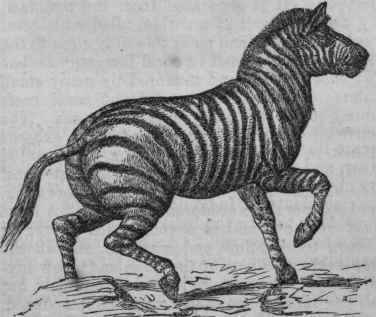Zebra
Description
This section is from "The American Cyclopaedia", by George Ripley And Charles A. Dana. Also available from Amazon: The New American Cyclopędia. 16 volumes complete..
Zebra
Zebra, the common name of the striped horse-like animals of South Africa, of which one has been described under Quagga. They come nearer the ass than the horse, having the tail furnished with long hairs only at the tip, and the hind legs without warts, and have accordingly been placed by Gray in his genus asinus; they are whitish or pale brown, elegantly striped with broad black bands. The best known and the handsomest is the common zebra (asinus zebra, Gray), rather smaller than the wild horse, which name it bears among the Dutch colonists at the Cape of Good Hope; it is a mountain species, and the bands exist on all parts of the body and limbs, even to the hoofs. The zebras are very wild, living together in herds, going with great rapidity from place to place; they seek the most secluded spots, grazing on the steep hillsides, and posting a sentinel; the senses of sight, smell, and hearing are remarkably acute, and their speed is very great; when attacked by man or beast, they form a compact body, with their heads in the centre and their heels toward the enemy, defending themselves against the largo carnivora by their kicks. The zebra has been used as a beast of burden, and it will cross with the horse and the ass.
The flesh is eaten by the natives and hunters in South Africa, and is said to be very good, though coarse. - There is another species (A. Burchelii, Fisch.), the dauw of the Hottentots, the peetsi or peechi of the more northern Africans, and the hippotigris of the ancients, which occurs as far north as Abyssinia; this, with the quagga, inhabits the plains, and like it has no black bands on the limbs; in the ears and tail, and the symmetry of its form, it is more like the horse than is the common zebra; its voice is a shrill, abrupt neigh, unlike the bray of an ass; it has the mane short and erect.

Zebra.
Continue to:


